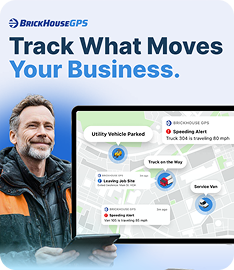
Save your business money with GPS tracking
Hey, do you still have your copy of the October 2024 issue of The American Journal of Transportation? Go grab it and we’ll review a few big takeaways together.
Got it? Great.
As you’ll probably remember from that issue (because who doesn’t?), The American Transportation Research Institute studied how GPS tracking affects the fuel efficiency of commercial fleets. According to the study, businesses that equipped their vehicles with GPS saw their fuel costs drop as much as 15%.
The researchers explained that adding tracking solutions to these companies’ trucks led to a bunch of operational improvements—like enabling smarter routes to jobsites and discouraging excess idling, speeding, and other fuel-guzzling behaviors by their drivers.
Okay, you probably didn’t read that article. No judgment. Everyone’s busy. But the takeaway is a valuable insight for your business: GPS boosts MPG and saves USD.
And that starts our list of the ways GPS vehicle tracking can save your company a small fortune.
1. GPS fleet tracking lowers fuel costs.
Let’s look at this from the other direction.
We’ll assume you’re not currently tracking your company’s vehicles with GPS devices. That means you’re not receiving regular reports on how your drivers are handling those vehicles on the road. And because your drivers know their behavior isn’t being monitored or recorded, they’re more likely to treat your vehicles in ways that undermine fuel efficiency.
Here’s research reported by the US Department of Energy:
“Aggressive driving (speeding, rapid acceleration and braking) wastes gas. It can lower your gas mileage by roughly 15% to 30% at highway speeds and 10% to 40% in stop-and-go traffic.”
So that’s one way equipping your vehicles with GPS can save your business money: bringing down your fuel expenses. Let’s look at a few more.
2. GPS data reduces timecard, uh, let’s call them “mistakes.”
If you’re not able to track your field techs or other drivers while they’re on the road in your company’s vehicles, you lose visibility into a lot of the details you need to ensure you’re paying them the right amount each pay period. A few examples:
- How much time does your average field rep spend sitting in your vehicle before and after a job? (And by the way, are they wasting fuel by keeping your engine idling?)
- How long did that job actually take your crew the other day?
- How often are your field reps using your vehicle and company time to run personal errands?
- How long are your drivers spending at lunch or on other breaks?
- Are your employees driving straight back to company HQ at the end of the day, or stopping for snacks or drinks before punching out?
In a survey conducted by Software Advice, 43% of hourly workers admitted they had over-stated on their timecards the number of hours they actually worked.
We don’t mean to pick on your field service employees or accuse anybody of anything. Heck, maybe all of your employees come from the other 57%.
But it can take a lot of effort to keep an accurate count of hours worked, especially when each job’s completion time is different sometimes 19 minutes, other times 47—and travel time to and from these jobsites varies wildly as well. Sometimes it’s easier just to wait until the end of a pay period and estimate the total number of hours. And as you can imagine, many employees are likely to round up.
Even if your employees are not intentionally misrepresenting their timecards, their innocent miscalculations can still add up to an enormous cost to your company. Research published in Business Management Daily finds that 75% of businesses lose money to “buddy punching,” where an employee clocks in or out for a coworker who isn’t actually there.
The news gets worse. Entrepreneur Magazine published research showing that the average business loses 4.5 hours of productivity every week to employee “time theft.”
Do the math for your company. If your average field service rep’s hourly rate is $25, and you’re overpaying your reps’ timecards by 18 hours every week, that’s costing you tens of thousands of dollars a year.
The great news: With GPS devices installed in your vehicles, you could track your employees’ whereabouts and automatically generate accurate timesheets—accurate to the minute, in fact—and save your company from spending a fortune in unearned payroll.
3. GPS tracking can lower your auto insurance.
It’s difficult to find insurance-industry data showing just how much you can save by adding GPS trackers to your vehicles, but the number can be substantial.
When you consider how much valuable data a GPS solution can provide a commercial auto insurer, it makes perfect sense that your broker or carrier would be willing to reduce your rates for equipping your fleet with tracking devices.
As Abbate Insurance Associates explains, GPS devices (and the data they store and collect) offer huge safety and legal benefits to their fleet—and, by extension, to the business insuring that fleet. For example, your GPS-equipped vehicles can provide proactive risk management (like encouraging safer driving behaviors, as we discussed above), theft recovery, and even telematics data that could be used as evidence in a collision involving your company’s vehicle.
These types of data are all obviously beneficial to your insurance provider. That’s why your insurer has an incentive to lower your rates in exchange for installing GPS across your fleet.
4. GPS data can improve your vehicle ROI.
In addition to keeping you informed about your vehicle’s location and how safely your driver is behaving on the road, GPS solutions can also send you data relating to the health of your vehicle, as well as alerts regarding maintenance needs.
The right type of GPS tracking system—for example, one that plugs directly into your truck’s OBD-II port—can send your team real-time alerts on the vehicle’s fault codes or other performance issues. With those types of messages, your company can react quickly and bring the vehicles in for service.
Without such messages, you might discover too late that one of your trucks needs a mechanic’s attention, when the problem has grown from a minor issue to a full-blown catastrophe causing downtime and requiring costly repairs. As the editors of the Kelly Blue Book put it:
“Vehicle maintenance does require an investment of time and money. But taking care of your car can often help you avoid major repair costs that follow a roadside breakdown.”
But you can take these capabilities further and build in automatic proactive alerts for your fleet’s maintenance. For example, you can schedule your onboard GPS units to monitor each vehicle’s mileage or engine time. When a vehicle crosses some milestone you’ve chosen—say, 15,000 engine hours or five months since its last maintenance appointment—your GPS solution can alert your fleet team that it’s time to arrange a visit to the mechanic.
And that’s yet another way GPS vehicle tracking can save your business money. Here’s one more…
5. GPS can improve utilization of your fixed assets.
Finally, you can affix GPS devices to important fixed assets, like trailers, containers, and the heavy equipment your field service teams haul to jobsites every day. That can make all the difference in determining whether your business has any chance of recovering machinery stolen from one of your vehicles or a jobsite.
The bad news is that most businesses don’t track their expensive machinery and equipment. And because they don’t, they have very little chance of retrieving it if thieves manage to grab it.
According to a joint report by the National Equipment Register and the National Insurance Crime Bureau, of all heavy construction and farm equipment stolen in 2016—generators, compressors, trenchers, welders, backhoes, tractors, etc.—only 21% was ever recovered.
The good news is that if you can track your machinery and equipment in real-time, your chances of guiding the cops to the bad guys go up considerably.
That’s what happened to a group of musicians touring in Seattle when crooks ran off with more than $50,000 of their equipment. Because the band had attached GPS devices to the equipment, the police were able to track down the thieves and return the musicians’ gear.
There you have it: five ways GPS trackers can save your business real money.
Sources
- AJOT.com: How GPS trackers are revolutionizing fleet management in the trucking industry
- FuelEconomy.gov: Driving more efficiently
- Workforce.com: 5 sneaky ways employees commit time theft
- BusinessManagementDaily.com: Understanding and preventing employee time theft
- Entrepreneur.com: Stealing time–how to tackle time theft in your company
- AbbateIns.com: Reduce your insurance with GPS fleet tracking
- KBB.com: Car maintenance guide—everything you need to know
- NER.net (National Equipment Register)—Equipment Theft Report
- MSN: GPS trackers help recover $52k in stolen gear from band touring in Seattle










